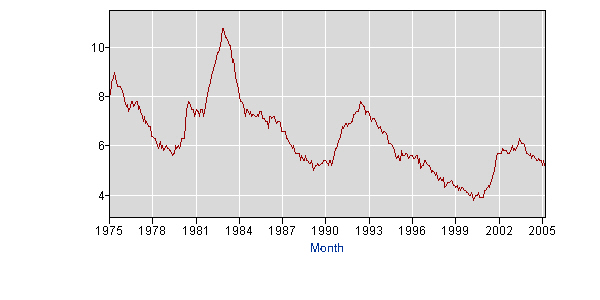Krugman is nostalgic for the wonderful days of the 70s again, as Econopundit points out. Makes you wonder if he also misses disco and bellbottom jeans. I discussed this earlier here, and here.
Working families have seen little if any progress over the past 30 years. Adjusted for inflation, the income of the median family doubled between 1947 and 1973. But it rose only 22 percent from 1973 to 2003, and much of that gain was the result of wives' entering the paid labor force or working longer hours, not rising wages.
Maybe Professor Krugman has never heard of the concept of diminishing marginal return. I don't have an economics PhD, but doesn't it stand to reason that as an economy develops through industrialization, its rate of growth would diminish? That is why China is able to attain growth rates pushing 10%, while the US is doing good at 4%. Why doesn't the good professor compare our income growth with equivalent economies over the last 30 years. Say Europe for example. Once again, I will post this easy to read graph, without any "shaping, slicing and selectively presenting data", and would someone please explain to me how things are getting worse for the American worker.
Working families have seen little if any progress over the past 30 years. Adjusted for inflation, the income of the median family doubled between 1947 and 1973. But it rose only 22 percent from 1973 to 2003, and much of that gain was the result of wives' entering the paid labor force or working longer hours, not rising wages.
Maybe Professor Krugman has never heard of the concept of diminishing marginal return. I don't have an economics PhD, but doesn't it stand to reason that as an economy develops through industrialization, its rate of growth would diminish? That is why China is able to attain growth rates pushing 10%, while the US is doing good at 4%. Why doesn't the good professor compare our income growth with equivalent economies over the last 30 years. Say Europe for example. Once again, I will post this easy to read graph, without any "shaping, slicing and selectively presenting data", and would someone please explain to me how things are getting worse for the American worker.
Unemployment Rate by Month 1975-2005

UPDATE: Some other good posts on this article. Brainster and Just One Minute.
UPDATE 2: I was thinking about this claim "But it rose only 22 percent from 1973 to 2003, and much of that gain was the result of wives' entering the paid labor force or working longer hours, not rising wages. " With a focus on the working longer hours part. I checked out the BLS, and although I could not find the exact numbers I was looking for, but I did find this comparison, titled "On the decline of average weekly hours worked" for a relatively equivalent time period, 1964-1999.
The Current Population Survey (CPS) shows that there has been little change in average weekly hours worked; from 1964 to 1999, there was a decline of 0.5 percent in the average weekly hours at work in nonagricultural industries.
The CES shows an even bigger decrease, which the author says is misleading. I will try and find more recent numbers, but regardless this does not indicate a rise in working hours which would partially explain away a 22% gain in average income.